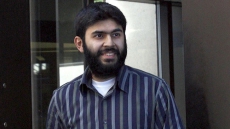OTTAWA — The RCMP turned to its closest allies this week for advice on countering violent extremists and a leading expert says Canada is finally making strides on addressing homegrown radicalism.
Lorne Dawson, a University of Waterloo sociology professor, helped the Mounties with an intensive session Monday at RCMP headquarters aimed at learning from experiences in Australia, Britain and the United States.
The meeting was planned long before the devastating terrorist attacks in Paris — assaults that have rekindled concern about extremist activity in Canada.
Dawson, co-director of the Canadian Network for Research on Terrorism, Security and Society, says he was pessimistic as recently as eight months ago about counter-radicalization efforts in Canada.
While the RCMP — the lead agency on the file — continues to lag behind allies, it looks like initiatives are now on track, Dawson said in an interview.
"It's finally got to the point where it seems in Canada, we're saying, 'Yes, we're going to do something about this.'
"The missing component is the buy-in from the new government," he said, quickly adding that early signs are positive.
Dawson hopes the recently elected Liberals will fulfil their promise of creating a federal co-ordinator on counter-radicalization and community outreach — something he sees as a key ingredient for national success.
Money will also be needed, he said, noting Canada spends only a fraction of the tens of millions of dollars Australia has devoted to dealing with extremism.

While some of Canada's international partners have done more to keep young people off the dangerous path of radical jihadism, Canadian agencies stand to learn from their missteps and adopt practices that are actually working, Dawson said.
He pointed to efforts in Australia to develop a system of hubs in major centres to provide assistance and counselling for people.
In the United States, the Federal Bureau of Investigation is working with federal partners to empower local agencies to prevent extremists and their supporters from inspiring, radicalizing or recruiting others to their cause.
"The RCMP, with more money and assistance, can handle — and is moving towards handling better — that intervention stage and developing a whole proper system for doing that," Dawson said.
Several municipal initiatives are also underway. Successful programs will bring together police, social workers and psychologists, Dawson said.
A co-ordinator of the kind proposed by the Liberals could help oversee national efforts and help design broad-based prevention strategies.
A final component is needed to deal with extremists who have been jailed for their crimes, Dawson believes.

"We need to start working more effectively with Corrections Canada to develop programs in prisons and to develop programs for after release — because most of the terrorists we're dealing with are going to be released."




